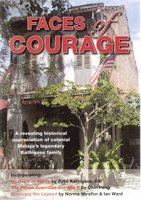article taken from The SunPETALING JAYA (Jan 8, 2007): It seems that reading about genies is inappropriate for local readers, and the authorities have chosen to black out the information -- rather than let readers discern for themselves if it is beneficial to read and know about them.
In the Dec 23 issue of The Economist an entire two-page article has been torn off and two sentences from another article have been blacked out.
The first article, a special report entitled Jinn -- Born of fire is about the belief among Muslims in Somalia and Afghanistan in the existence of the jinn or genie.
In the second article, A child of Bethlehem -- No end of history, an excerpt about Muslim and Christian women visiting a shrine related to the Blessed Virgin Mary has been obliterated with black ink.
When the matter was brought to his attention, Deputy Minister of Internal Security Datuk Fu Ah Kiow said he was not aware of this.
However, he pointed out that the government has the responsibility to censor all imported publications to ensure their contents are appropriate and suitable for Malaysian readers.
"We have guidelines in doing our job. We do not allow certain things such as pornographic materials and writings which are seditious, sensitive to religion and contain subversive elements," he told theSun.
However, in the day and age of the Internet, readers can read the whole version of the two articles in The Economist on its website at www.economist.com -- which makes the ministry's attempt to filter information seem futile.
"That is beside the point," Fu said, adding that while no one can control the Internet, the government has the power to control the kind of books and magazines being circulated in the country.
"It does not mean that if the Internet allows it, we should also allow it. It is just the same logic as nude photos. People can get it freely over the Internet but we do not allow them to be brought in here easily," he said.
While there is a guideline, the interpretation has not been consistent across the different entry points to the country and the ministry is trying to address this.
He said the ministry is improving the procedure and guidelines on the approval of permits to bring in foreign publications.
This includes streamlining the procedure at the entry points and creating better understanding between the ministry and local importers and publishers.
"The ministry's Publications and Quranic Text Control Division will meet book importers and publishers soon and if all goes well, we will have a better standardised guideline by March.
"We want a better understanding so that the industry will not incur unnecessary costs when they bring in books which will end up being banned and our officials will not have extra work for no reason," he said.
At present, he said, although there is a guideline, enforcement officers at different entry points tend to make different judgments when deciding on whether a particular book should be allowed into the country.
That is why we are also training our staff so that everyone will agree on the same thing when looking at a certain picture, he said.
Updated: 12:44AM Mon, 08 Jan 2007
